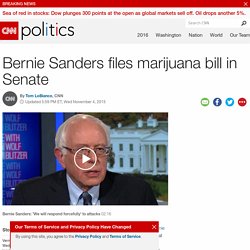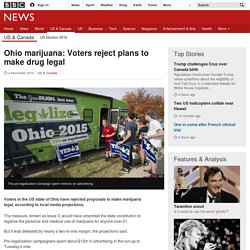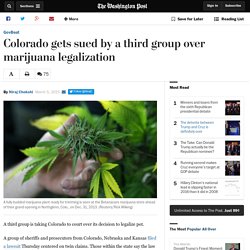

Looks like Democrats have a weed fight coming. By Jonathan Bernstein October 22, 2013 A marijuana plant.

(Matilde Campodonico/Associated Press) The news today from Gallup is that, for the first time in its polling, a majority — indeed, a solid majority — of Americans back legalizing marijuana. So far, most politicians have stuck with support for the status quo, or perhaps the status quo plus various exemptions and loopholes. With 58 percent of all respondents and 65 percent of Democrats favoring legalization, however, there’s now a very good chance that a fair number of ambitious Democratic politicians are going to sign up for full legalization as a way to differentiate themselves in Democratic primaries.
Bernie Sanders says marijuana sales should be regulated like alcohol. Bernie Sanders would remove marijuana from the most dangerous federal drug category if elected president, the Democratic candidate announced on Wednesday.

The Vermont senator revealed his proposal during a student town hall meeting at George Mason University in Virginia. Sanders told the attendees that marijuana should be downgraded by being removed from the Drug Enforcement Agency’s Schedule I list of the most dangerous drugs. How President Bernie Sanders could end the federal marijuana ban. When Vermont senator Bernie Sanders called for an end to federal marijuana prohibition last week before an audience of college students, he went further than any major national presidential candidate before him.

“It’s the first time a presidential candidate has made such a forthright statement on legalization,” said Michael Collins, deputy director at Drug Policy Action. “[It’s a] a fairly big nail in the coffin of prohibition.” But that’s not the only reason his declaration was significant. While many proposals from Sanders and other candidates may not actually come to fruition under any US president because they rely on the cooperation of Congress, ending federal prohibition is something a President Sanders could achieve. That’s because a process exists that requires only the executive branch of government. Bernie Sanders files marijuana bill in Senate. While some states have legalized pot, it remains illegal on the federal level.

"It's a state and a federal issue. The federal issue is that we should remove marijuana from the Controlled Substance Act. That's a federal decision," Sanders told CNN. Here's Where The GOP's 2016 Presidential Contenders Stand On Marijuana Legalization. While the federal government maintains a blanket ban on marijuana, recreational marijuana is already legal in four states and the District of Columbia.

In addition, 23 states, as well as D.C., have legalized marijuana for medical purposes. And with at least 10 more states expected to consider legalization in some form by 2016, the next president of the United States will almost certainly have to reckon with the disparity between state and federal law on marijuana. Recreational marijuana -- which has been legalized in Colorado, Washington, Alaska and the District of Columbia, and will soon be legal in Oregon -- remains altogether illegal at a federal level under the 1970 Controlled Substances Act. The states that have legalized marijuana have only been able to do so because of federal guidance urging prosecutors to refrain from targeting state-legal marijuana operations. That guidance, however, could be reversed when a new administration enters the White House.
Ohio marijuana: Voters reject plans to make drug legal. Image copyright AP Voters in the US state of Ohio have rejected proposals to make marijuana legal, according to local media projections.

The measure, known as Issue 3, would have amended the state constitution to legalise the personal and medical use of marijuana for anyone over 21. But it was defeated by nearly a two-to-one margin, the projections said. Pro-legalisation campaigners spent about $12m in advertising in the run-up to Tuesday's vote. A Point of View: The all-American drive to legalise marijuana. Image copyright Getty Images The gradual legalisation of cannabis across US states is a triumph for the American Dream, says Sarah Dunant.

I've recently returned from the west coast of Canada, where a fiery gold autumn was the perfect backdrop for an outpouring of national optimism after the Canadians elected the 43-year-old Liberal leader Justin Trudeau as their prime minster. Greeting voters on the subway next morning, trick-or-treating with his children - the arrival of this dynamic newcomer, sprinkled with dynastic fairy dust, ended almost a decade of Conservative government during which Canada suffered something of an identity crisis.
For a country that successfully defined itself as not being the United States, his predecessor's policies on tax, foreign affairs and the environment severely blurred that distinction. Colorado gets sued by a third group over marijuana legalization. A fully budded marijuana plant ready for trimming is seen at the Botanacare marijuana store ahead of their grand opening in Northglenn, Colo., on Dec. 31, 2013.

(Reuters/Rick Wilking) A third group is taking Colorado to court over its decision to legalize pot. A group of sheriffs and prosecutors from Colorado, Nebraska and Kansas filed a lawsuit Thursday centered on twin claims. Those within the state say the law — passed by voters as a constitutional amendment in 2012 — forces them to choose between the state and federal constitutions. Those out-of-state law enforcers charge that the Colorado law is doing them undue harm.